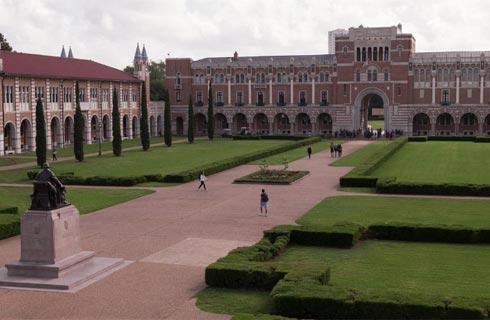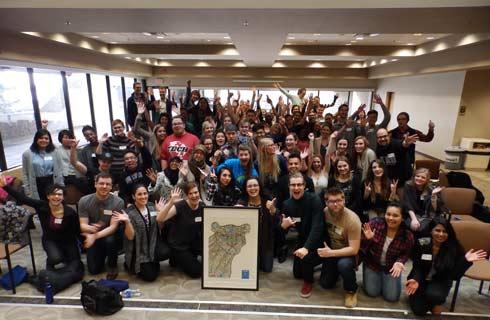Bachelor of Science in Neuroscience (Neuroscience Scholars Option)

学历文凭
Bachelor Degree

专业院系
Department of Neuroscience

开学时间

课程时长

课程学费

国际学生入学条件
Please submit documentation showing that you have completed (or will be completing) an accredited secondary school series equivalent to that of a U.S. high school. Please ensure your official record or transcript (mark sheet) shows your secondary work and grades (or marks) from 9th to at least the end of 11th grade. You will need to include 9th grade even if that work was completed at a different institution. You should also include copies of your official final examinations taken at the end of the secondary school program, including external exams such as the General Certificate of Education (GCE) O and A level examinations, school leaving certificates and matriculation exams. If you have earned any college credit (including dual credit) while in high school, submit official transcripts to UT Austin. Please provide official English translations together with the original language records.
High School Prerequisites - You must complete or be on track to complete certain high school coursework to be competitive for admission.
SAT/ACT Scores - Students should submit at least one set of scores directly from the testing agency. We do not require the SAT Essay or ACT Writing scores. Scores included in transcripts and copies of score reports dont meet this requirement. When you ask the testing agency to send your scores, use the codes the agencies have designated for UT Austin:
SAT 6882
ACT 4240
Resume
Letters of Recommendation
TOEFL: 79 (internet-based test)
IELTS: An overall band of 6.5 on the Academic Examination
IDP—雅思考试联合主办方

雅思考试总分
6.5
- 雅思总分:6.5
- 托福网考总分:79
- 托福笔试总分:160
- 其他语言考试:NA
CRICOS代码:
申请截止日期: 请与IDP联系 以获取详细信息。
课程简介
相关申请
 预科
预科 奖学金
奖学金 实习机会
实习机会 在校学习
在校学习 跨境学习
跨境学习 校园授课-线上开始
校园授课-线上开始 在线/远程学习
在线/远程学习
开学时间&学费
学费信息仅供参考,请与IDP联系以获取详细信息
| 开学时间 | 时长 | 学费 | 地点 |
|---|
学校排名

世界排名39
数据源:
泰晤士高等教育世界大学排名
关于德克萨斯大学奥斯汀分校

作为一所长期排名Top15的美国公立大学,UT-Austin算得上是实至名归。位于奥斯汀大学城内的校园拥有总人数排名全美第5的大学人口。提供常青藤级别高等教育的UT-Austin,学费仅仅保持在一般公立大学的水平,难怪每年都能吸引50000多名学生在此就读。UT-Austin 135个专业中,属商科和工程学专业最为强势。本科生除了可以在10个本科商科专业中任选其一之外,还有机会参加专门为MBA学生设计的快速商务课程。工程学方面,UT-Austin所有的本科工程学专业全部至少排名美国Top20,其中很多属于全美10强的行列。用学生自己的话说,我们的工程学毕业生不用找工作,而是被工作找。奥斯汀不是一个典型的大学城,但它可以算是去UT的决定性因素之一。位于第六大道的夜生活中心,充满了各种酒吧和餐馆,在这里你可以欣赏到各种专业级的音乐表演,从爵士乐到摇滚到蓝调音乐到民谣。奥斯汀的另外一个名字是“蝙蝠城”,春天和夏天有许多墨西哥皱鼻蝙蝠生活在国会大道桥的下面。这是北美最大的城市蝙蝠群体。和现场音乐会一样,抓蝙蝠是奥斯汀最为流行的活动。
本校相关课程

Doctor of Philosophy in Computer Science
学历文凭
Ph.D.
开学日期
课程费用总额


Doctor of Philosophy in Marine Science
学历文凭
Ph.D.
开学日期
课程费用总额


Doctor of Philosophy in Mathematics
学历文凭
Ph.D.
开学日期
课程费用总额


Doctor of Philosophy in Microbiology
学历文凭
Ph.D.
开学日期
课程费用总额


Doctor of Philosophy in Neuroscience
学历文凭
Ph.D.
开学日期
课程费用总额


Doctor of Philosophy in Physics
学历文凭
Ph.D.
开学日期
课程费用总额

其他相关课程

心理学哲学博士-认知神经科学
 滑铁卢大学
滑铁卢大学学历文凭
Ph.D.
开学日期
课程费用总额


行为神经科学理学学士
 劳伦森大学
劳伦森大学学历文凭
Bachelor Degree with Honours
开学日期
课程费用总额


心理学和神经科学哲学博士
 达尔豪斯大学
达尔豪斯大学学历文凭
Ph.D.
开学日期
课程费用总额


神经科学理学学士
 达尔豪斯大学
达尔豪斯大学学历文凭
Bachelor Degree
开学日期
课程费用总额


神经科学理学硕士
 渥太华大学
渥太华大学泰晤士高等教育世界大学排名:188
学历文凭
Masters Degree
开学日期
课程费用总额


神经科学哲学博士
 渥太华大学
渥太华大学泰晤士高等教育世界大学排名:188
学历文凭
Ph.D.
开学日期
课程费用总额










 美国
美国